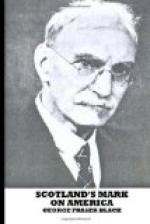Bacon’s Rebellion (1676) was a Scot. Henry
Barclay (1712-64), Rector of Trinity Church, New York,
Trustee of the New York Society Library, and a Governor
of Columbia University, was the son of John Barclay,
a Scot, Surveyor General of East New Jersey.
Robert Sandeman (1718-71), born in Perth, and died
in Danbury, Connecticut, was principal founder of the
Sandemanians or Glassites. John Mason, a native
of Linlithgow, “one of the most accomplished
preachers and pastors of his day,” was appointed
Minister of the Scotch Presbyterian Church, New York,
in 1761. James Caldwell (1734-81), soldier parson
of the Revolution, was of Scots parentage or descent.
Finding the Revolutionary soldiers short of wadding
he distributed the church hymn books among them, with
the exhortation, “Now, boys, put Watts into
them.” His son, John E. Caldwell, was one
of the founders of the American Bible Society.
Alexander McWhorter (1734-1807), of Scottish parentage,
took an active part in Revolutionary matters and was
a Trustee of Princeton College. McWhorter Street
in Newark, New Jersey, is named in his honor.
James Waddell (1739-1805), famous in Virginia as “The
Blind Preacher,” was probably a grandson or
great-grandson of William Waddell of Monkland parish,
Scotland, one of the prisoners captured at Bothwell
Brig in 1679. Samuel McClintock (1732-1804),
minister of Greenland, New Hampshire, of Scottish
origin, was present at Bunker Hill and appears in
Trumbull’s painting of the battle. Four
of his sons served in the Revolutionary war.
Alexander McLeod (1774-1833), born in the island of
Mull, died in New York as Pastor of the First Reformed
Church. Described as “a powerful preacher,
a man of learning and wisdom, and a devout Christian.”
George Buist (1770-1808), born in Fifeshire, Scotland,
educated in Edinburgh, “one of the most eloquent
and distinguished divines of his day,” was Pastor
of the Scots Church in Charleston and President of
the College of Charleston. Alexander Campbell
(1786-1866), founder of the Campbellites, was born
in Antrim of Scots ancestry. Walter Scott, another
of the founders, was born in Moffat, Dumfriesshire.
John Dempster (1794-1843), founder of Boston Theological
Seminary, which afterwards became the Theological School
of Boston University, was of Scots parentage.
Peter Douglas Gorrie (1813-84), clergyman, and historian
of the Methodist Church in the United States, was
born in Glasgow. John McClintock (1814-70), of
Drew Theological Seminary and leading editor of McClintock
and Strong’s “Cyclopaedia of Biblical,
Theological, and Ecclesiastical Literature,”
was of Scottish descent. Robert Stuart MacArthur,
born in Canada, in 1841, of Scots parentage, Minister
of Calvary Baptist Church, New York, has published
many volumes of sermons, essays, and narratives of
travel. Robert Mackenzie (b. 1845), President
of San Francisco Theological Seminary, was born in
Cromarty. Robert McIntyre (b. 1851), Methodist
Episcopal Bishop of California, was born in Selkirk.
Joseph Plumb Cochran, Medical Missionary to Persia,
the “Hakim Sahib” of the natives, was
grandson of a Scot. John Alexander Dowie (1848-1907),
founder of the so-called “Christian Catholic
Apostolic Church in Zion,” was born in Edinburgh.
Mary M. Baker Glover Eddy (1821-1910), claimed partly
Scots descent (from MacNeils of Barra).




